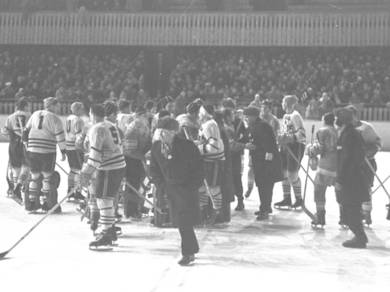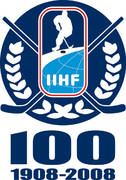

Story #25 Soviet Union win their first Olympics, starting a new hockey eraFebruary 4, 1956 — Cortina d'Ampezzo
When the Soviets won the 1954 World Championship in Stockholm, their first ever international tournament, they shocked Canada and the hockey world. But by 1956, there was no shock factor heading to the Olympics in Cortina d’Ampezzo, Italy. Canada had reclaimed the world title in 1955, but it was clear the main competition would come from the newcomer on the World hockey scene. Nonetheless, Canada’s representatives, the Kitchener-Waterloo Dutchmen (with Martin Brodeur's father Denis as one of the goalies), were not able to provide enough of a challenge for their new rivals.  On this day, however, Puchkov was unbeatable and Canada’s offence was stymied. Canada dominated the first period but couldn’t score. In the second period, Canada was again the better team, but the only goal was scored by Yuri Krylov at 6:20. Canada’s hopes were deflated early in the third when Kuzin scored just 37 seconds after the faceoff, and this 2-0 lead was all the Soviets needed. The victory ensured a gold medal, and the U.S. edged past Canada by defeating the Czechs 9-4 for the silver. About the Top 100 StoriesAs part of the IIHF's 100th anniversary celebrations, www.IIHF.com is featuring the 100 top international hockey stories from the past century (1908-2008). Starting now and continuing through the 2008 IIHF World Championships in Canada, we will bring you approximately three stories a week counting down from Number 100 to Number 11.
The Final Top 10 Countdown will be one of the highlights of the IIHF's Centennial Gala Evening in Quebec City on May 17, the day prior to the Gold Medal Game of the 2008 World Championship.
These are the criteria for inclusion on this list: First, the story has to have had a considerable influence on international hockey. Second, it has to have had either a major immediate impact or a long-lasting significance on the game. Third, although it doesn't necessarily have to be about top players, the story does have to pertain to the highest level of play, notably Olympics, World Championships, and the like. The story can be about a single moment — a goal, a great save, a referee's call — or about an historic event of longer duration — a game, series, tournament, or rule change. |
 Click here for the 100 Top Stories
|
|






